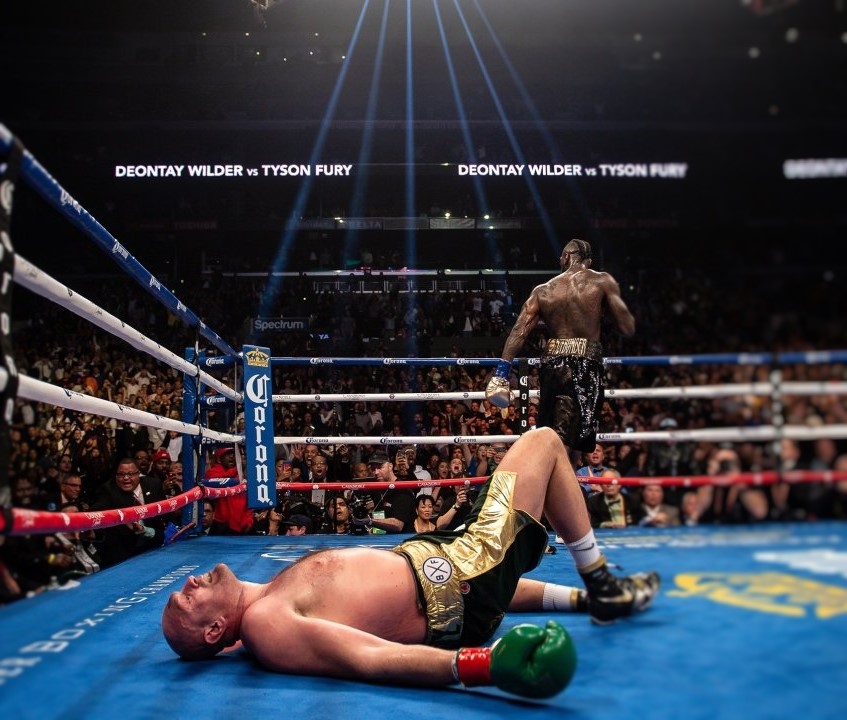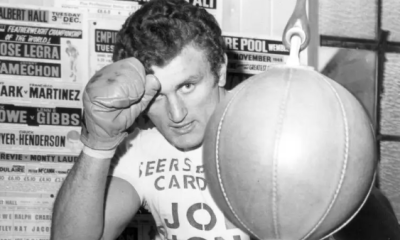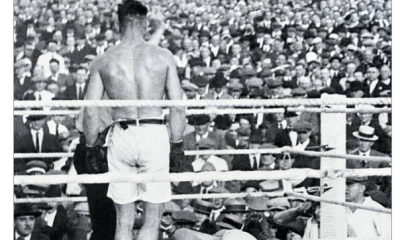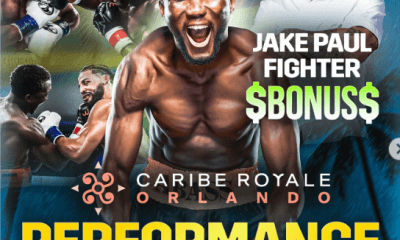Featured Articles
Art and Heroism in a Corrupted Sport

Tyson Fury lay in the ring like the Pietà in still life. Deontay Wilder’s right hand put him there, one of a scant few he didn’t get underneath. It landed behind his ear and sent his head flopping into the path of a left hook that sent all six-feet-nine-inches of him down with a crash.
The faces in the crowd—glomming, mouths agape, eyes burning with mad glee—morphed into a Bellows painting.
“…Two,” said referee Jack Reiss.
Fury was the only figure in the house that wasn’t moving. He stared at the ceiling as if something fearful was there, and a strange sound came from his throat—a raspy exhale, the kind you’d expect to hear from a man in the midst of night terrors. Unlike the Pietà, no one was holding him.
“…Three…”
He’d been there before; in that lonely place, flat on his back, nowhere to look but up. The desert monks called it acedia and considered it a form of existential despair. They were familiar enough with it to name it—the “noonday devil” attacks when the sun is highest, when everything is at its most brilliant.
Fury encountered it in 2015, after defeating Wlad Klitschko to become heavyweight champion. He was at the top of the world; he could reach up with one finger and touch the sun, but something was very wrong. “I had everything that a man could possess . . . but it meant nothing,” he said. So he did what rock stars do. He filled his emptiness with bodily pleasures, with animal beatitudes. “I was on Tony Montana and beer. Twenty pints, four or five times a week.” At four hundred pounds (“and counting”), his career was lost. His family moved out of the house. Legions of fans deserted him when he reached up with the wrong finger and sparked outrage with off-the-cuff and likely off-his-head comments about Jews, women, and gays.
“It was one of the greatest collapses in modern sports history,” said Rolling Stone.
“I don’t want to live,” said Fury.
He was all but finished. Then he blinked and made a decision.
That’s how recovery always begins: with a decision, a private commitment. The great “I will.” At first it was a narrowing of glazed eyes; he’d come back to the ring, have a few fights, see what happens. He told his wife, who saw only his flushed face and whale blubber. “Don’t try,” she said.
But Fury was looking beyond mere sport.
A product of a gypsy culture that reveres the figure of “the fighting man” most of all, he instinctively understood that this battle was personal. It had to be brought into the desert. His objective was not to reclaim lost glory but to transition from darkness into light the only way he knew how, by giving himself a familiar purpose, by devoting himself to daily discipline—and one look at him on a StairMaster was enough to prove that his twelve-step program required far more than twelve steps. He made sobriety a habit, lost a hundred forty-four pounds, and surrounded himself with men who brought hope first, expertise second.
In June and August, he defeated two respectable opponents and then sought out the most ferocious puncher in the heavyweight division.
—And dominated him in almost every exchange, demonstrating defensive superiority and an agility no giant ought to possess. Wilder, a one-dimensional puncher unconcerned with strategy and impervious to the pleadings of his corner, threw bomb after bomb that sailed over Fury’s ducking, dipping, slipping head a hundred times. In the ninth round, one of them finally got in, bouncing off the back of Fury’s head and sending him down. He wasn’t hurt; he saluted something over his head and proceeded to win the tenth and eleventh rounds on all three scorecards.
Wilder’s singular intention to get Fury out of there had gone from a confident plan A-no-need-for-B to a desperate hope. When he dropped Fury hard in the twelfth round, he swaggered off to a neutral corner and made a throat-slashing gesture with his glove to disguise his relief. As he stood ticking off ten seconds in his head, his manager was running along ringside ready to celebrate.
“…Five…”
Fury was staring at the ceiling, as motionless as marble. Then he blinked.
“…Six…”
He blinked again like a man with the rising sun in his eyes, the kind who doesn’t hit snooze, who gets up and goes to work.
He did just that. In the last minute of the last round, he was back in inspiration-mode. He hit Wilder with a right hand and left hook, stunning him and forcing him to grab hold.
The bell rang and it was bedlam in the Bellows crowd. Everyone in the raucous Staples Center and in living rooms across two continents was asking the same question: “How’d he get up?!”
Wilder was mystified. “I don’t know how he got up. Everyone knows I got heavy hands and I hit hard. I literally seen his eyes rolling in the back of his head,” he said at the post-fight conference. “Only God know how he got back up.”
When Fury came out and sat at the microphone, reporters forgot to honor the current zeitgeist and take Christ out of Christmas. “Did Jesus Christ come down and wake you up?” asked one of them. “What happened?”
“I think so. I had the holy hands upon me tonight and I was brought back. Rose me to my feet at the brink of defeat.” Fury said it matter-of-factly, then wavered. “I can’t tell you because I don’t know. I don’t know what happened.”
It was a miraculous, career-best performance that should have seen him up on the cards by at least eight rounds to four and up by at least two points despite two knockdowns. But this is boxing and it’s a corrupted place. Fury got no better than a draw.
Judge Alejandro Rochin—who had the wrong fighter winning seven rounds to five—is the Laszlo Toth of this story. He took a hammer and vandalized a stirring experience. What was he thinking? At best, he confused Wilder with Fury for the first four rounds and scored accordingly. At worst, someone or somebody with a substantial financial interest in Fury not winning got to him. At the very least, bank deposit slips of such judges should be examined and they should be deported from the sport like Toth was from Italy.
Why Great Britain’s Phil Edwards scored the seventh round for Wilder and thus forced the draw is a mystery. It should require his appearance in a locked room to review that round with a competent judge and Teddy Atlas.
Art and heroism don’t flourish amid corruption. When they do, they’re magnified. Brilliance is blinding in the dark. That, and referees like Jack Reiss, are about all that keep us coming back to a sport that cannot differentiate between a champion and a contender any better than Rochin can fighters four feet in front of him. Even so, Fury’s soul-stirring round twelve against Wilder measures up against any great heavyweight round of the last thirty years. It’s as stirring as Evander Holyfield’s round ten against Riddick Bowe and almost as stirring as George Foreman’s round ten against Michael Moorer. It is added unto the rich folklore of the flagship division.
Holyfield fought for little guys routinely outgunned, Foreman for old-timers. Fury has an eighty-five-inch reach and stretched his arms further than both. It was while he was laying there all but finished, he said—especially then, that he was representing “everybody who suffers round the world.” And everybody, one supposes, includes not only those with mental illness but Jews, women, and gays.
The Pietà depicts the compassion of one who knows first-hand what suffering is, and how redemptive it can be. Michelangelo grasped the higher context of his work and sought to honor it. He was doing more than carving stone. Fury, neither hero nor artist, sought to do more than simply win a prizefight. “It’s no secret what I been through,” he said. “I had to show that you can continue and you can carry on, and anything is possible.”
Yeah. That’s good. Inspiring. But how’d he get up?
__________________
Springs Toledo is the author of The Gods of War (2014), In the Cheap Seats (2016), and Murderers’ Row (2017). Smokestack Lightning: Harry Greb, 1919 is scheduled for release on 1/1/2019 as an eBook.
Check out more boxing news on video at The Boxing Channel
To comment on this article at The Fight Forum, CLICK HERE
-

 Featured Articles4 weeks ago
Featured Articles4 weeks agoThe Hauser Report: Cinematic and Literary Notes
-

 Book Review3 weeks ago
Book Review3 weeks agoMark Kriegel’s New Book About Mike Tyson is a Must-Read
-

 Featured Articles2 weeks ago
Featured Articles2 weeks agoThe Hauser Report: Debunking Two Myths and Other Notes
-

 Featured Articles3 weeks ago
Featured Articles3 weeks agoMoses Itauma Continues his Rapid Rise; Steamrolls Dillian Whyte in Riyadh
-

 Featured Articles4 weeks ago
Featured Articles4 weeks agoTop Rank Boxing is in Limbo, but that Hasn’t Benched Robert Garcia’s Up-and-Comers
-

 Featured Articles3 weeks ago
Featured Articles3 weeks agoKotari and Urakawa – Two Fatalities on the Same Card in Japan: Boxing’s Darkest Day
-

 Featured Articles2 weeks ago
Featured Articles2 weeks agoNikita Tszyu and Australia’s Short-Lived Boxing Renaissance
-

 Featured Articles2 weeks ago
Featured Articles2 weeks agoIs Moses Itauma the Next Mike Tyson?



















